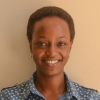David

David is the present Study Coordinator of Sickle Cell Disease Genomics Network of Africa (SickleGenAfrica). The project aims at studying genetics of cytoprotective proteins that neutralize hemolysis DAMP molecules and acute organ damage, genome-wide determinants of malaria complications and echo-cardiovascular dysfunction in Sickle Cell Disease (SCD) patients. The study has six (6) sites namely, Accra, Abuja, Lagos, Kumasi, Kano and Dar Es Salaam with Accra being the coordinating site.
David is a T. H. Chan Harvard School of Public Health, Harvard University trained Statistical Geneticist under the quantitative core group mentored by Peter Kraft.
He holds a PhD in Epidemiology and Biostatistics from the University of Amsterdam, an MPhil in Health Informatics (Cum Laude) from the University of Ghana, and a BSc in Biological Sciences from the Kwame Nkrumah University of Science and Technology. He has several training experiences. Specifically, an advanced certificate in Biostatistics and Epidemiology from the Netherlands Institute for Health Sciences, Erasmus Medical Centre, Erasmus University.
David is currently a Senior Lecturer at the Department of Medical Laboratory Sciences, School of Biomedical and Allied Health Sciences, University of Ghana. He is an active member of H3Africa Kidney Research Network and Research on Obesity and Type 2 Diabetes among African Migrants (RODAM) projects. David’s research areas are modelling of chronic kidney disease in low resource environments and among migrants with keen interest in the link between other chronic diseases (sickle cell disease, diabetes, hypertension ) and chronic kidney disease. David serves on several committees at the College, School and departmental levels. David has over 40 peer reviewed publications to his credit and reviews of several journals (PlosOne, BMC Public Health, International Health, Renal Failure etc).



